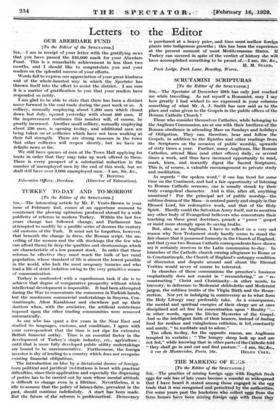TURKEY TO-DAY AND TO-MORROW
[To the Editor of the SPECTATOR.] SIR,—The interesting article by Mr. F. Yeats;Brown in your issue of February 2nd, comes at an opportune moment to counteract the glowing optimism produced abroad by a wide publicity of reforms in modern Turkey. Within the last live years change has followed change, and Parliament has attempted to modify by a prolific series of decrees the century old customs of the Turk. R must not be forgotten, however, that beneath the change in dress, the Roman script, the un- veiling of the women and the silk stockings (for the few who can afford them) lie deep the qualities and shortcomings which are characteristic of a low peasant stock. In order that these reforms be effective they must reach 'the bulk of her rural population, whose standard of life is almost the lowest possible in the world, who. lack the most necessary luxuries and who lead a life of strict isolation owing to the very primitive means of communication.
Turkey is confronted with a superhuman task if she is to achieve that degree of comparative prosperity without which intellectual development is impossible. It had been attempted during the War to concentrate the commerce in Turkish hands, but the mushroom commercial undertakings in Smyrna, Con- stantinople, Aflon Karahissar and elsewhere put up their shutters when, with the armistice, the artificial restrictions imposed upon the other trading communities were removed automatically.
As one who has spent a few years in the Near East and studied its languages, customs, and conditions, I agree with your correspondent that the time is not ripe for extensive British financial outlay. Time is an essential factor in the development of Turkey's staple industry, viz., agriculture ; until that is more fully developed public utility undertakings are bound to be unremunerative. Furthermore, the foreign investor is shy of lending to a country which does not recognize
existing financial obligation's.
The introduction en bloc by. a dictatorial decree of foreign- born political and juridical institutions is beset with practical difficulties, since their application and especially the dispeniting of justice has to be carried out by men whose mental attitude is difficult to change even in a lifetime. Nevertheless, it is idle to assume that the policy of laissez-faire,-prevalent in the past, should continue indefinitely. A start has been made. But the future of the reforms is problematical. bemocracy
is purchased at a heavy price, and time must mellow foreign plants into indigenous growths ; this has been the experience at the present moment of most Mediterranean States. If Turkey can succeed in spite of the verdict of history she will have accomplished something to be proud of.—I am, Sir, &c., Park Lodge, Park Lane, Bewdley, Worcs.
H. M. STAND.










































 Previous page
Previous page